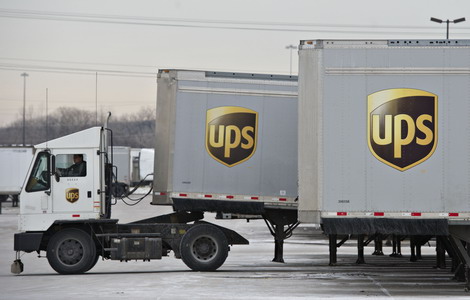 |
|
|
|
|||||||||||
|
 United Parcel Service Inc's purchase of TNT Express NV on Monday will increase UPS' presence in China's international express market, according to analysts. [Photo / Bloomberg] |
United Parcel Service Inc's 5.16-billion-euro ($6.8 billion) purchase of its Dutch rival TNT Express NV will heighten competition in China's international express market, but the move is unlikely to alter the sector's domestic playing field, analysts said.
TNT accepted a cash offer of 9.5 euros per share, compared with a 9-euro bid it turned down last month, according to a joint statement released by the companies on Monday. This is the largest purchase in the 104-year history of UPS, the world's largest package delivery company.
The deal will enable UPS to become the market leader in Europe and gain access to TNT's networks in the fast-expanding Asian and Latin American markets, analysts said.
"TNT Express fits into UPS' long-term network plan," said UPS Chief Executive Scott Davis. "This broadens UPS' global footprint."
Analysts said the deal will increase UPS' presence in China's international express market, which is already dominated by multinational companies. But they differed on whether it will jeopardize DHL's market leadership.
"With the two companies' brands and networks combined, UPS will become more competitive and be able to attract more customers, which will affect DHL's China-Europe business volume," Xu Yong, chief consultant with China Express Consulting Website, a logistics industry consultancy, told domestic media.
But Zhang Mingqi, an analyst with Changjiang Securities Co Ltd, said: "The two companies need time to consolidate their resources in China's market."
Even when they are combined, it will be difficult for the two companies to compete with DHL, Zhang said. "DHL will remain the market leader."
The world's four largest logistics companies - DHL, Federal Express Corp, TNT and UPS - entered the Chinese market in the 1980s.
Although they have achieved steady growth in the country's international express market, none have managed to get a big piece of the action in the domestic market.
DHL currently leads the market with 35 percent of China's international business, compared with a "small market share in domestic business", according to the company.
Analysts said the competitiveness of China's domestic express companies hinges mainly on their lower labor and management costs.
"The deal is unlikely to help UPS in China's domestic market," Zhang said.
"It will affect China's domestic companies only when they are big enough to compete with multinational companies," he added.
For UPS, the deal will expand its revenue outside the United States from the current 26 percent of the company's total to 36 percent, and increase its presence in Brazil and Australia, company executives said.
Reuters contributed to this story.